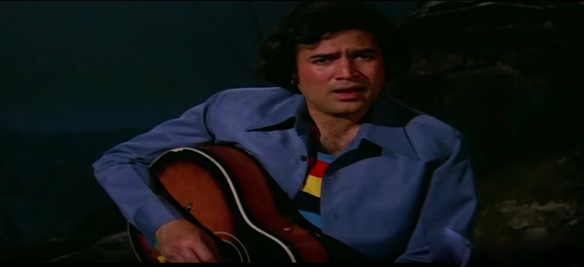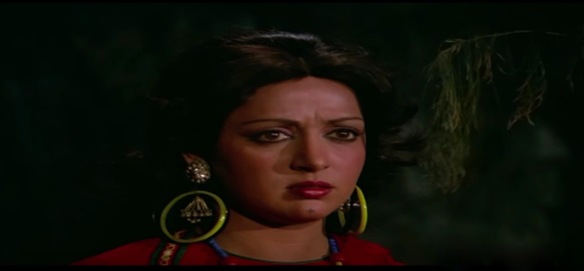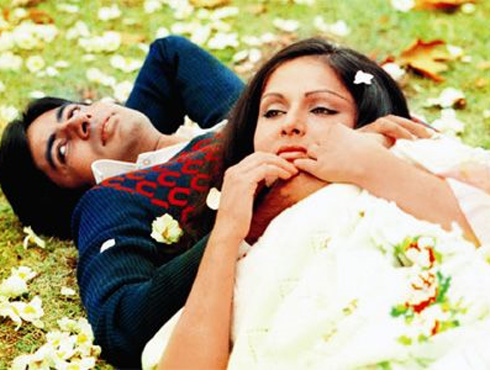
Rajesh Khanna soaks his blue bell bottoms as he croons to Hema Malini in the rain in Mehbooba (1976).
Today we highlight the lyrics and English translation of “Mere Naina Sawan Bhado” from Mehbooba (1976). Starring Hema Malini and Rajesh Khanna, Mehbooba is a dramatic reincarnation (punar-janam) love story that can only exist in Bollywood. When contemporary pop singer (played by Rajesh Khanna) is gifted an antique sitar for his birthday, he begins to unravel the mysteries of his past life and search for the woman whose musical talent once mesmerized him (played by the lovely Hema Malini). Mehbooba journeys from hip city life of 1970s Bombay to a countryside royal court of the 1800s where a court musician and dancer fall in love despite the misgivings of society.
First sung by Hema Malini in their past life when she believes Rajesh Khanna has deceived her, the female version of “Mere Naina Sawan Bhado” is a tragic rendition, bursting with lovely alaaps that befit the classical nature of that period’s music. “Mere Naina Sawan Bhado” is reprised later in the film in the modern day as Rajesh Khanna seeks to remind Hema Malini (now reincarnated as a local village belle) of their former bond. The male version is…well, steamier, in one sense of the word.
One of Mehbooba‘s most iconic scenes occurs when Rajesh Khanna begins to sing “Mere Naina Sawan Bhado” in the middle of a raging stormy night, luring Hema Malini from her sleep to discover the mysterious voice filling the air. Lightening flashes menacingly, everyone’s hair is blowing wildly, and still the guitar plays on (check out more on Bollywood rain songs here!). While the male version sung by Kishore Kumar is arguably more popular (Kumar himself ranked this song in his top ten personal favorites!), the female version sung by Lata Mangeshkar is as hauntingly beautiful and enhances our understanding of the former.

Hema Malini’s memories of a past life are stirred when she hears “Mere Naina Sawan Bhado” from Mehbooba (1976).
Mehbooba was written by Gulshan Nanda who also wrote the screenplay of Neel Kamal (1968)–a film about a woman who visits an old palace where she discovers she was a court dancer in her previous life and that her former lover is still searching for her. Sound kind of familiar? We all see what you did there, Gulshan. Mehbooba will also literally carry a sense of deja-vu for to anyone who has seen Kudrat (1981), conveniently also starring Rajesh Khanna and Hema Malini caught in a punar-janam love tangle. However, Kudrat is a darker film with flashes of expressionist inspiration that elevate the entire genre and likely contributed to its greater commercial success.
With music by R.D. Burman and lyrics by Anand Bakshi, “Mere Naina Sawan Bhado” is a passionate tribute to old memories. We hope you appreciate the lyrics and learn from our English translation of both versions of “Mere Naina Sawan Bhado” below!
Mere Naina Sawan Bhado Lyrics and English Translation:
Male version:
Mere nainaa saawan-bhaado.N
My eyes are like the monsoons
Phir bhii meraa man pyaasaa
Yet still my mind remains thirsty
Aye dil diiwaane, khel yeh kyaa jaane?
Oh crazy heart, what does it know of this game?
Dard bharaa yeh giit kahaa.N se
From where does this pain-filled song
In ho.NTho.N pe aaye? duur kahii.N le jaaye
come to these lips? Take me far away
Bhuul gayaa kyaa? bhuulke bhii hai
What have I forgotten? Even though I forget
Mujhko yaad zaraa saa, phir bhii meraa man pyaasaa
I remember a little, yet still my mind is thirsty
Baat puraanii hai, ek kahaanii hai
This is an old conversation, this is a story
Ab sochuu.N tumhe.N, yaad nahii.N hai
Now I think you do not remember
Ab sochuu.N nahii.N bhuule woh saawan ke jhuule
Now I think you could not forget those swing sets of the rainy season
Rut aaye, rut jaaye deke
I saw the seasons come and go
JhuuThaa ek dilaasaa, phir bhii meraa man pyaasaa
This lie is a consolation, yet still my mind is thirsty
Baraso.N biit gaye, hamko mile bichhaDe
Ages have passed since we met and were separated
Bijurii bankar, gagan pe chhamke
We were like lightening that sparkled in the sky
Biite samay kii rekhaa, mai.N ne tumko dekhaa
But that line of time has passed since I saw you
Man sang aa.Nkh-michaulii khele
Playing hide and seek with my mind
Aashaa aur niraashaa, phir bhii meraa man pyaasaa
(were) hope and despair, yet still my mind is thirsty
Female version:
Mere nainaa saawan-bhaado.N
My eyes are like the monsoons
Phir bhii meraa man pyaasaa
Yet still my mind remains thirsty
Ghungharuu kii chham-chham, ban gayii dil kaa gham
The sound of the dancing bells become the sadness of my heart
Duub gayaa dil, yaado.N mei.N
My heart drowned in memories of you
Ubharii berang lakiire.N, dekho yeh tasviire.N
Only to emerge as colorless sketches, look at these portraits
Suune mahal mei.N naach rahii hai
In a lonely palace, still dancing
Ab tak ek rakkaasaa, phir bhii meraa man pyaasaa
Even now is a performer, yet still my mind is thirsty
Glossary:
nainaa: eyes; saawan-bhaado.N: the 5th and 6th months of the Panjabi (Nanakshahi) calendar that comprise the monsoon season; man: mind; pyaasaa: thirsty; dil: heart; diiwaanaa: crazy; khel: game; dard: pain; bharaa: filled; giit: song; kahaa.N: where; ho.NTh: lips; duur: far; bhuulnaa: to forget; yaad: memory; puraanii: old; kahaanii: story, legend; sochnaa: to think; bhuulnaa: to forget; jhuulaa: swing set; rut: season; jhuuThaa: lie; dilaasaa: consolation; baras: age, years; biitnaa: to pass; milnaa: to meet; bichhaDnaa: to be separated; bijuri: lightening; gagan: sky; chhamaknaa: to sparkle; samay: time; rekhaa: line; aa.nkh-michaulii: hide-and-seek; aashaa: hope; niraashaa: despair; gham: sadness; Duubnaa: to drown; ubharii: raised; berang: without color; lakiraaa: line; tasviir: picture; suunaa: lonely, mahal: palace; naachnaa: to dance; tak: until; rakkaasaa: dancer

Smooth-operator Rajesh Khanna executes his devastating wink mid-guitar pluck, completely obliterating anyone’s initial repulsion at his haircut.
Did you know Rajesh Khanna actually sings the first antra of the song in a separate scene that takes place in broad daylight? He opens with his famous wink that still manages to induce swoons despite his distractingly dated ‘do! Think I’m the only one obsessed with the hair and outfits in these films? This week our local independent movie theatre happened to be doing a Bollywood series (obviously, I soaked up every moment), including a special screening of Om Shanti Om (2007). During the song “Main Agar Kahoon,” something felt eerily familiar…check out Shah Rukh Khan’s outfit below to see what I mean! It’s one of the many subtle meta classic film references that make Om Shanti Om such a brilliant work!

Shah Rukh Khan imitates Rajesh Khanna’s scarring unforgettable blue bell bottom ensemble with a rainbow top in Om Shanti Om (2007).
– Mrs. 55












